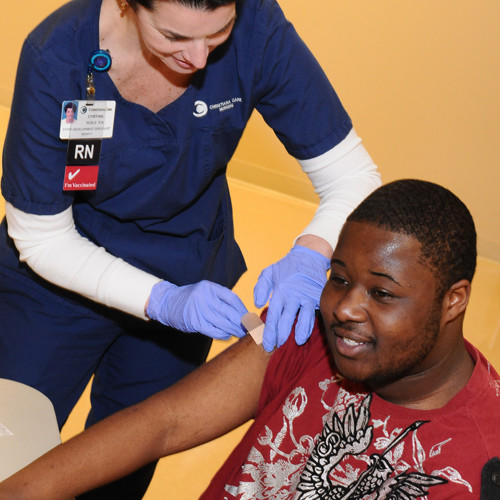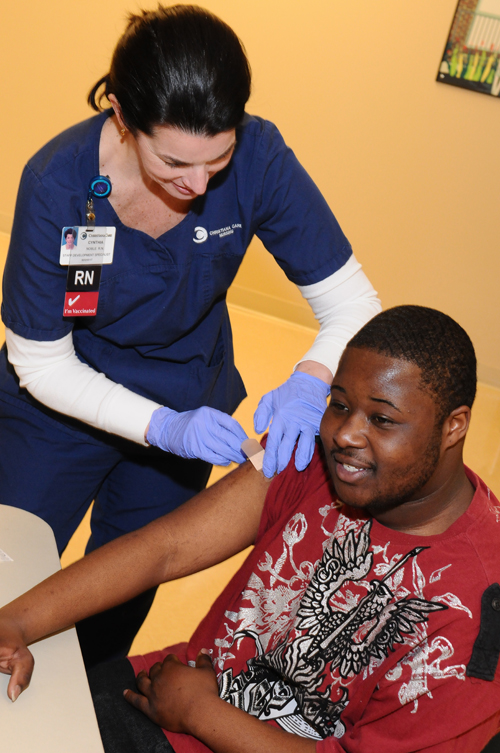Christiana Care meets challenges of severe flu season with innovation, caring


This year’s influenza outbreak was the earliest since 2003, with many more cases than in past years, according to the Delaware Division of Public Health.
Christiana Care nurses, physicians and staff have risen to the challenge, finding innovative ways to meet the huge spike in demand while continuing to provide excellent care to each patient.
“This was definitely not only an earlier, but a more severe flu season than we have experienced in a while,” said Christiana Care Infection Prevention Officer and Hospital Epidemiologist Marci Drees, M.D. “There is some evidence now that flu activity is beginning to decline, but it’s definitely still circulating in the community. I think this season is a good example of why we take flu so seriously, and why we strive to vaccinate all our health care workers. It would have been a lot more difficult to cope if we had also been struggling with staffing issues due to many people being out with the flu.”
In addition to vaccinating more than 93 percent of our staff, who wear “I’m vaccinated” tags on their ID badges, Christiana Care provided almost 1,500 free flu vaccinations to visitors at Christiana Hospital and Wilmington Hospital. Nursing educators and infection-prevention nurses stepped up to administer the vaccines in a coordinated project with support from Pharmacy and Employee Health. Vaccine stations outside the outpatient pharmacy in Christiana Hospital and in the temporary main entrance corridor at Wilmington Hospital gave visitors the opportunity to get immunized on the spot.
“Thanks to everyone who helped make this happen and who participated by serving as vaccinators,” Dr. Drees said. “I know the effort was well-received, and I have no doubt that this effort helped us to avert potential flu-related illness and hospitalizations.”
While the intent of the free vaccination stations was to immunize people who were already visiting the hospital, word spread, and some people made the trip specifically to get vaccinated.
“One patient said she rode two buses to get the shot because she could not find it anywhere else or afford the co-pay, and it was a “true blessing,” said Ann-Marie C. Baker, BSN, RN, CPAN, BC, staff education specialist. “A family of nine who emigrated from Turkey came for their shots, and they were so happy that one girl said it was part of her birthday celebration.”
Staff at the stations reported that many of the adults who received free vaccinations were getting a flu shot for the first time in their lives.
For the flood of patients coming into the emergency department with flu-like symptoms, staff worked hard to ensure that there was room for everyone.
At Christiana Hospital, staff expanded the emergency department into an adjoining conference room to handle the overflow, and converted inpatient family rooms on four floors of the E Tower to semiprivate rooms, effectively creating 16 available new beds, while Care Management staff focused on freeing up isolation beds.
For patients presenting at Wilmington Hospital who required hospitalization, a double-posting process was initiated that allowed them to be transferred to Christiana Hospital if there was no bed available at Wilmington. “This offered sick patients arriving at Wilmington Hospital a choice to have access to the first available bed at either hospital, so no patient would have to wait any longer than necessary to be placed,” said Steve Rhone, administrative director, Patient Access and Capacity Management.
To speed laboratory testing turnaround, the lab at Wilmington Hospital introduced a new, rapid-detection flu test.
“We ramped up staffing on several shifts to meet the capacity challenge,” said Cheryl Katz, vice president, Pathology and Laboratory Services.
When high usage of the rapid test kits created a national shortage, Katz said, “The kits were rationed, forcing the lab to carefully monitor the testing processes and the timing. Christiana Care deserves credit for stewarding its supply of the kits to optimize their benefit to our neighbors.”
The test went live for the EDs on Dec. 30 and live systemwide on Jan. 2,” said Cynthia Flynn, M.D., a Christiana Care pathologist. “We process each flu sample upon receipt in the lab and stay as close as possible to a two-hour or less turnaround time.”
Overall, the efforts by staff at every level and in every department to meet the challenges of this flu season have been remarkable.
“Staff support and willingness to work extra hours to provide the necessary services is showing The Christiana Care Way in action,” said Gary Ferguson, chief operating officer. “The ED and Environmental Services staffs, Nursing, Pathology and Lab Services, Care Management and Information Technology teams and many other departments have gone to great lengths to serve our neighbors.”